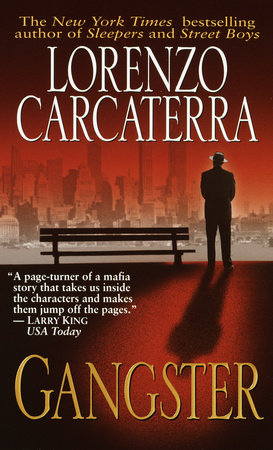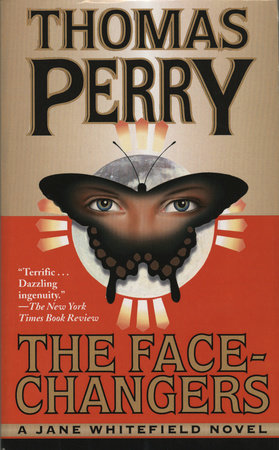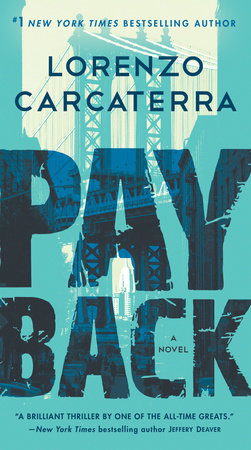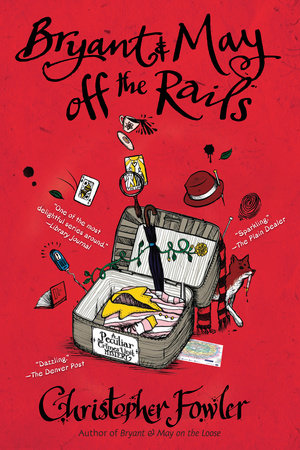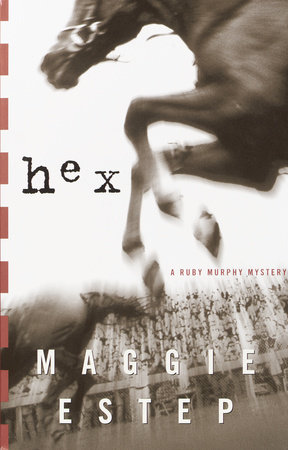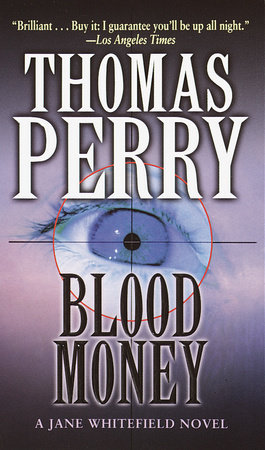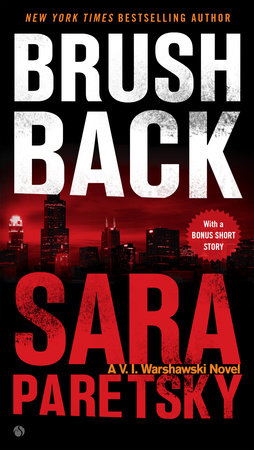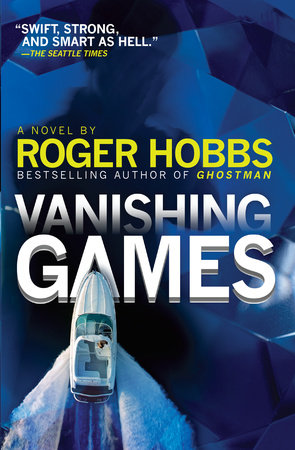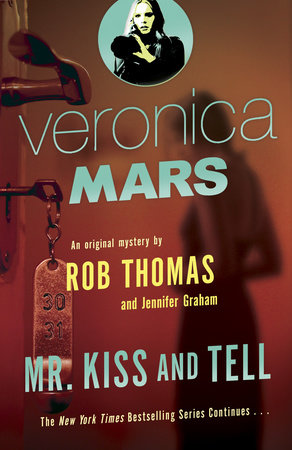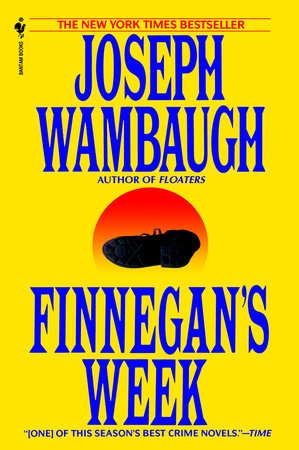Q: How would you describe the evolution of this project?
A: I always wanted to do a gangster story but not like any that had been done before. I love Mario Puzo’s work. He set a new standard when it comes to organized crime fiction. David Chase equaled that standard with The Sopranos. What I want to do here is tell the story of a man’s life, and all the circumstances in that life which led to him becoming a gangster. I said to my editor, "If I’m successful in what I’m trying to do, by the end of this book you’ll be crying over someone you wouldn’t normally care about or even like." I don’t know if we succeeded. On some level I think we have but at this point it’s up to the reader to decide. The other thing I wanted to do was a love story on different levels. Gangster is a love story between two friends, Angelo and Pudge. It is a love story between Angelo and Isabella. It is a love story between Angelo, Pudge, and the young boy they take in. And it is a love story between the narrator and the woman he meets. I’m not the kind of author who’s usually associated with love stories so this was a departure for me.
Q: How difficult was Gangster to write?
A: It was my most difficult book. Notwithstanding the fact that there’s a thirty year lag between book one, which runs from 1906 to 1934, and book two, which runs from 1964 to 1996, I had to be prepared to deal with a story that ranges across nine decades.
Q: What are you trying to give readers here?
A: I want readers to get a sense of what gangsters are like. When you pull back from the story itself I want to bring you into this world as closely as possible–not so much for a romantic vision of gangsters but to truly understand their world. And when I’m talking gangsters, I’m talking about that generation that came to power from the 1930s to the 1960s, and even a bit into the 1970s. From a writer’s point of view these old time gangsters are more interesting as characters than the current crop. They’re fun to deal with. They operate on so many levels. Emotionally, they’re "of-the-moment" people. And each gangster approaches that moment differently. Some, like Pudge, are always in attack mode. Others, like Angelo, are more thoughtful and reflective. When they come down, they do so in a way that is more powerful than the gangster who reacts immediately.
Q: What does Gangster have in common with your other books?
A: Like all my books this is a story about friendship (and the friendships in this book are crucial); redemption, loyalty, revenge, and love. It is also a story that goes full circle. In this case the narrator, a young boy taken into the mob at age ten by Angelo, ends up living the life Angelo’s father envisioned for himself in America but was unable to achieve.
Q: Why do you return again and again in your books to these themes of redemption, loyalty, revenge, and love?
A: I don’t do it consciously. It just happens. I’m southern Italian so revenge becomes a part of your life whether you like it or not. My parents were basically illiterate but they were great storytellers. From an early age their bedtime stories to me were tales of revenge and redemption. My mom, who spoke only Italian, was very Catholic. If you know anything about that religion, you know that a lot of its stories end in some sort of payoff. My father was an ex-con who did time for murder. His bedtime stories were about gangsters and fighters, west side guys and hoodlums. They all ended with revenge. A part of that stays with you forever. I should also add that as a young reader, revenge was something I was attracted to. The Count of Monte Cristo–a story of pure revenge–was my favorite book. Friendship and loyalty were also significant aspects of the environment from which I came. Many of my friends, the ones who are still living, are friends I’ve had for many years. And within that circle there’s only four or five people I truly trust. They make up the inner core. If I needed something immediately they would be there for me.
Q: From the days of James Cagney, George Raft, and Paul Muni, through The Godfather and Goodfellas, straight up to today’s Sopranos, stories of mobsters have always captivated us. Why do these kinds of stories continue to enthrall?
A: Mobsters are seen as rebels and it’s easy to romanticize them. And, again, we are talking about gangsters from the early 1930s up to the time of John Gotti. I don’t know enough about the Russian Mafia, or the Chinese Triads. Clearly they’re dangerous but they’re not as multi-layered. The guys I’m writing about were very funny, very brutal, and somewhat complex. Some, surprisingly, were very well-read. The very formation of the mob in America was based on the Roman legions and Roman history. In order to set that up you’d have to have some clear idea of what Roman history was. I also find fascinating the notion that Lucky Luciano set the country up as a national crime commission. It was an incredible feat. People often say of various gangsters, if they had only applied themselves they could have ended up running Ford or GM. Well, these guys did apply themselves but they applied themselves to what they were good at. Their story is the story of our country–but with guns.
Q: What’s the greatest challenge of revisiting a genre that has been so thoroughly mined in the past?
A: To keep up with the standard that’s been set while avoiding what has already been done. As I wrote this book I was always on the lookout for what I called "Mario Puzo country." If at any point I entered what was familiar terrain, my editor, would call and say no! It was the same for The Sopranos. In fact at one point in the writing process we tossed out an entire section set in Italy because it smelled remotely of The Godfather. What my editor made me do was figure out how to keep that part of the story, so the book could take an interesting turn, but move it out of that familiar terrain. We worked as hard on this book as we did on any book I’ve done. From first to third draft we changed roughly thirty percent of the story. This was the first time I truly understood what a writer friend once told me: you never finish a book, you abandon it.
Q: You grew up in Hell’s Kitchen during the 1960s. How much of that experience found its way into this story?
A: What there is comes from those bedtime stories I was telling you about. Pudge’s story about "Two-Gun" Crawley comes directly from what my father told me about him. The only research I did dealt with New York at the turn of the century. I knew the city was populated by gangs back then but I never realized to what extent they ruled. That’s where the character Ida the Goose comes from. Many of the gangs at that time were run by women. These were rough, tough characters. While reading old newspaper accounts I ran across a description of a beautiful woman who headed one of the most notorious gangs. She evolved into the Ida character–the women who takes in these two boys, Angelo and Pudge. Angus McQueen is a composite of several real gangsters including a smidgen of Owney Madden.
Q: Do you tell the same bedtime stories to your kids that your dad told you?
A: They’re not as interested as I was because they’re not living in the same environment I lived in. Most of the stories I pass on to them are sports related. And you have to be careful how a child takes a gangster story. I wouldn’t want them to think of gangsters as heroes. If I were to tell them some of those old stories, I’d want them to understand who those people were and why they acted the way they did.
Q: There are clear echoes of your own experiences in this book. When you were fourteen you learned that your father killed his first wife. When Angelo is eight years old he discovers that before he was born, his father killed his brother. Was it difficult writing that scene?
A: It wasn’t difficult at all. It just happened. In fact I never really considered a possible link between Angelo’s situation and my own until you mentioned it. I guess that sort of thing crops up unconsciously. Once that kind of event happens in your life it stays with you on so many levels and sneaks in from time to time. The more difficult scene to write was the one in which Paolino kills his first son. Apparently that was fairly prevalent in Naples and Sicily in those days. Fathers would rather have their sons dead than have them join the ranks of the Camorra, or the Mafia. That scene provided the ultimate irony to this story. Here we have a father who killed his son to prevent him from becoming a gangster, only to have his second son become not only a gangster but the most powerful gangster in America. I was definitely attuned to the link with my own experience there. One reason I never did drugs when I was a kid was that my father sat me down and told me if he had a choice between having a dead son or a druggie son, he’d bury me himself. I guess you can question his approach but, I can assure you, it was very effective.
Q: Beyond this link that you never consciously saw, how much fact about you is in this fiction?
A: I wasn’t as ingrained in the gangster world as the kid is in the story. Yes, I knew the guys in the neighborhood and I was friendly with them. I would go to their bars and watch the ball games. I would listen to them talk because I always found them to be great storytellers. There were places you could go–if they knew you–where you felt safe and where they took care of you . If you were out of line they would tell you. They had parental authority. But at night I went home to my own family. I didn’t live in the room above the bar. And I never got to see them at their day jobs. I got to see them when they were kicked back and relaxed. From a kid’s point of view, particularly growing up in that environment, theirs was a great way of life. They had cash in their pockets and dressed well. Thankfully it would be difficult for my children to be attracted to that life. They have plenty of other things that capture their attention. But in my Hell’s Kitchen neighborhood it was the mob guy who got you jobs. If your dad was behind in his loan shark payments it was the mob guy who could ease the pressure. If I had nowhere to go, if my parents disappeared one morning, I could easily see myself, at age ten, going to the local hood and saying "what do I do?"
Q: Your first two books A Safe Place and Sleepers were non-fiction. Apaches and Gangster are works of fiction. Which do you enjoy writing more?
A: Fiction’s a lot more fun to write. It allows you more freedom. Non-fiction writing is very restrictive. There’s an overabundance of rules. One of the first editors who looked at A Safe Place told me it would be better if your father said "I’m sorry I killed her." Well, he didn’t say that. Maybe it would have made for a better story but with non-fiction you’re restricted to what was said (and what the lawyers say you can or cannot use.) Novels, on the other hand, provide great freedom to the writer because the characters are people you’ve invented. The thing you have to do, however, is avoid falling into the "favorite character" trap. You have to restrain yourself from making that character your "go to" guy, the one who gets all the good lines or anecdotes. Pudge became that character for me in this book. I respected Angelo, but I really liked Pudge.
Q: What do you think will most surprise readers of this book?
A: I think readers will be surprised at how warm, loving, and romantic this story is. That is something readers don’t expect from me, especially when they consider the stories I’ve written in the past. There were touches of romanticism in Sleepers, but nothing compared to what I bring to this work.
Q: Authors of fiction often describe how, during the writing process, their characters take over and do things they hadn’t intended them to do. Did that happen here?
A: That happened a lot in this book. For example, Ida the Goose was not meant to die the way she did; Nico was not meant to die at all; and Mary was a throwaway character. I never intended her to become what she became. When she walked into the hospital room at the beginning of the book I had no idea who she was going to be. Then I wrote the line in which the narrator says "she had something to say that would alter my life forever." Suddenly she became a pivotal character in the narrator’s life but it wasn’t part of the original plan.
Q: A deal has been made to adapt Gangster into a miniseries for ABC. Where does the project stand and how involved will you be in it?
A: The book was optioned by producer Joe Roth prior to publication. The way the schedule breaks down now is that we’re going to start shooting in the spring and air during the November, 2001 sweeps period. As to my involvement–I’m the executive producer, so if it’s a flop I guess you can blame me.
